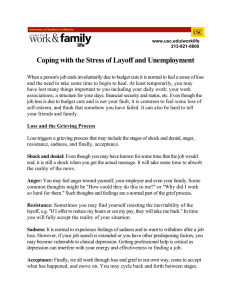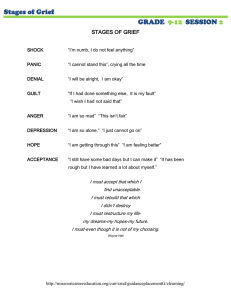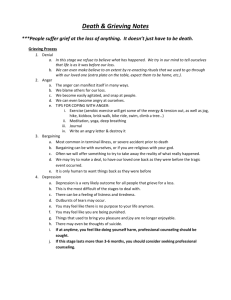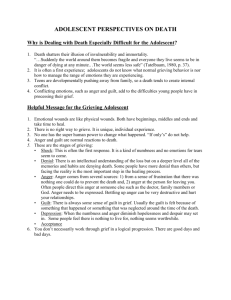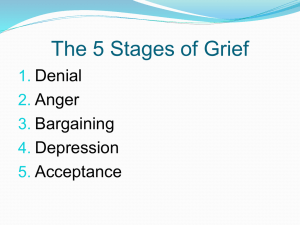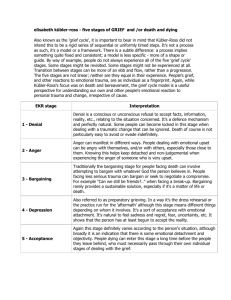Document 15567951
advertisement
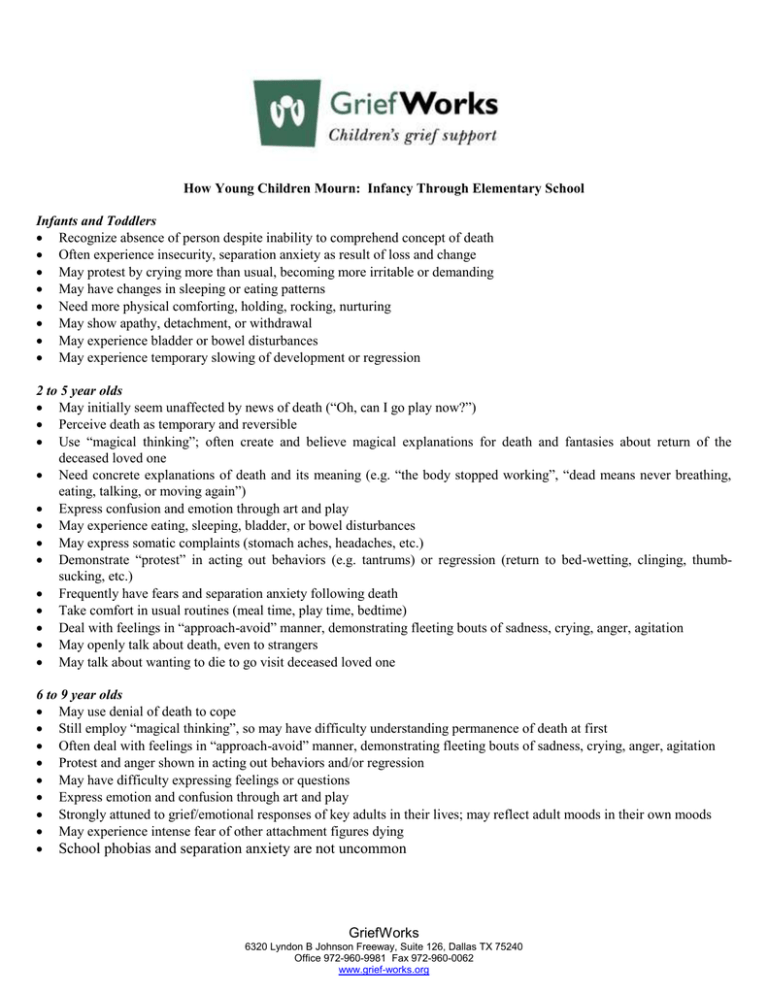
How Young Children Mourn: Infancy Through Elementary School Infants and Toddlers Recognize absence of person despite inability to comprehend concept of death Often experience insecurity, separation anxiety as result of loss and change May protest by crying more than usual, becoming more irritable or demanding May have changes in sleeping or eating patterns Need more physical comforting, holding, rocking, nurturing May show apathy, detachment, or withdrawal May experience bladder or bowel disturbances May experience temporary slowing of development or regression 2 to 5 year olds May initially seem unaffected by news of death (“Oh, can I go play now?”) Perceive death as temporary and reversible Use “magical thinking”; often create and believe magical explanations for death and fantasies about return of the deceased loved one Need concrete explanations of death and its meaning (e.g. “the body stopped working”, “dead means never breathing, eating, talking, or moving again”) Express confusion and emotion through art and play May experience eating, sleeping, bladder, or bowel disturbances May express somatic complaints (stomach aches, headaches, etc.) Demonstrate “protest” in acting out behaviors (e.g. tantrums) or regression (return to bed-wetting, clinging, thumbsucking, etc.) Frequently have fears and separation anxiety following death Take comfort in usual routines (meal time, play time, bedtime) Deal with feelings in “approach-avoid” manner, demonstrating fleeting bouts of sadness, crying, anger, agitation May openly talk about death, even to strangers May talk about wanting to die to go visit deceased loved one 6 to 9 year olds May use denial of death to cope Still employ “magical thinking”, so may have difficulty understanding permanence of death at first Often deal with feelings in “approach-avoid” manner, demonstrating fleeting bouts of sadness, crying, anger, agitation Protest and anger shown in acting out behaviors and/or regression May have difficulty expressing feelings or questions Express emotion and confusion through art and play Strongly attuned to grief/emotional responses of key adults in their lives; may reflect adult moods in their own moods May experience intense fear of other attachment figures dying School phobias and separation anxiety are not uncommon GriefWorks 6320 Lyndon B Johnson Freeway, Suite 126, Dallas TX 75240 Office 972-960-9981 Fax 972-960-0062 www.grief-works.org How Older Children Mourn: Middle School Through Adolescence 10 to 12 year olds Better understanding of death intensifies shock and sadness responses May experience school phobias and separation anxiety May express somatic complaints (headaches, stomach aches) May stop expressing grief to “protect” parents or siblings or to appear strong and “in control” Need encouragement and opportunities to express feelings and memorialize Tend to identify strongly with deceased loved one, adopting his/her habits, mannerisms, interests Vulnerable to “parentification”, i.e. taking on adult roles to help grieving adult family members Grief process complicated by early changes of puberty and associated developmental challenges Adolescents Grief complicated by intense challenges of adolescence (increased independence and responsibilities, physical changes, sexuality, identity development, etc.) Abstract thinking skills allow more sophisticated understanding of death and spiritual issues May experience fears about own mortality, or be in denial of this and try to prove immortality through reckless or risky behavior May employ maladaptive behaviors to self-soothe and provide comfort (substance abuse, skipping school) Commonly experience temporary decreases in school performance May experience depression, guilt, and concerns about things said or left unsaid Anger may manifest in tantrums, defiance, or withdrawal Vulnerable to “parentification”, i.e. taking on adult roles to help grieving adult family members Signs of Complicated Grief in Children and Adolescents The following signs may indicate that the grieving child or adolescent needs professional help: Chronic or severe somatic symptoms (headaches, stomach aches, etc.) Pronounced self-blame or guilt Chronic or severe school problems, including skipping school Ongoing Nightmares/sleep disturbances Extreme regression (return to bedwetting, clinging, thumb-sucking, etc.) Poor self-care Excessive hopelessness Extreme anger/hostility/violence or other extreme acting out/defiance Social isolation/extreme withdrawal Sudden change in friends/peer group Intense separation anxieties or phobias Apparent absence of grief or unwillingness to discuss the loss Intense involvement in dating relationship to the exclusion of other friends or activities Extreme negativity/gloom Intense attraction to the topic of death, or fixation on the subject of death Illegal activity/violating the rights of others Substance abuse Suicidal thoughts or plans GriefWorks 6320 Lyndon B Johnson Freeway, Suite 126, Dallas TX 75240 Office 972-960-9981 Fax 972-960-0062 www.grief-works.org
